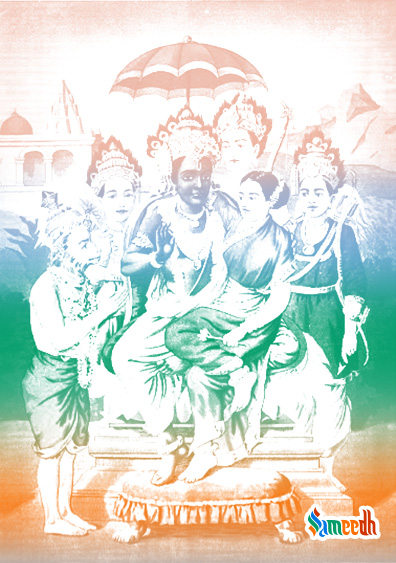As mentioned in the Ramcharitmanas, Rishi Kakbhushundi had the ability to travel beyond time, where nature’s cycles simply repeat them. As a result, he was able to witness the Ramayan being performed eleven times and the Mahabharat being performed sixteen times, each time with a

Image Source: Google Arts & Culture
Much earlier than Rishi Valmiki, Bhagwan Shiv, and Sant Tulsidas, Rishi Kakbhusundi, an ardent follower of Bhagwan Ram, was the first one to narrate the Ramayan. The name of the sage is related to the term ‘Kak’, which literally means ‘crow’, since in his final incarnation, he was transformed into a crow by Rishi Lomas, but he eventually chose to spend the remaining years in that form.
Who was Rishi Kakbhushundi?
The story of Kakbhushundi is duly mentioned in the Ramcharitmanas, written by Sant Tulsidas. Kakbhushundi underwent a number of births before attaining a human form. He travelled the hermitages of several Rishis in order to gain wisdom. Once, Lomas Rishi taught him the concepts of Nirgun Brahman in his ashram. But Kakbhushundi insisted on teaching him regarding Sagun Brahman. Kakbhushundi was not willing to accept the teachings, disregarding Lomas Rishi’s best efforts to persuade him of the virtues of nirgun devotion. In a fit of rage, the Rishi cursed him to be reborn as a crow. After cursing his disciple, Lomas Rishi changed his mind and taught him the principles of Sagun Brahman. Since Kakbhushundi wished to retain the crow form wherein he first learned about Sagun Brahman, he did not change it. According to belief, Kakbhushundi is still alive and he is believed to remain here until the end of the earth.
Kakbhushundi as preacher
He was bestowed by Bhagwan Ram with such profound intellectual and spiritual wisdom that he not only became one of the earliest Ramayan preachers but also the spiritual teacher of Garud and many others. In addition, Kak Bhusundi was endowed with eternal devotion to Bhagwan Ram and immortality. Kakbhushundi witnessed the Mahabharat being enacted sixteen times and the Ramayan eleven times, each with a different ending. According to the scriptures, one of Kakbhushundi’s key characteristics is his ability to travel beyond time, where nature’s cycles simply repeat them. As a result, he was able to witness the Ramayan being performed eleven times and the Mahabharat being performed sixteen times, each with a different outcome. As a result of Kakbhushundi’s devotion to Bhagwan Ram, it is also believed that whenever Bhagwan takes an avatar on earth during a new Kalpa (aeon), he travels to the place of Bhagwan’s birth place just to watch the childhood days.
Kakabusundi has witnessed all of the yugs passing by him. Garud once met him and asked him about life. Garud asked seven questions, and Kakbhushundi addressed all of them. The conversation between Garud and Kakbhushundi is based on the attributes of God and the way of love. Garud’s questions concern the purpose and importance of human life, the greatest suffering, the greatest joy, the distinctions between right and wrong, the greatest virtue, the worst sin, and mental illnesses. These inquiries and responses are examined and spoken upon.
Lessons we can learn from Kakbhushundi’s life
The story of Kakbhushundi shows how our shortcomings are frequently overlooked in spiritual development. Kakbhusundi was faithful to the Almighty, but at first, his love was motivated by hatred for a few specific individuals. Despite his early flaws, he was able to become a spiritual entity through bhakti yog and become an awakened crow by meditating upon Bhagwan Shree Ram. We might assume Kakbhushundi’s forgiveness from Bhagwan Ram based on our little understanding of his spiritual development. Also, Kakbhushundi attained a spiritual state where forgiving others was not obligatory. He had actually gone beyond qualities.